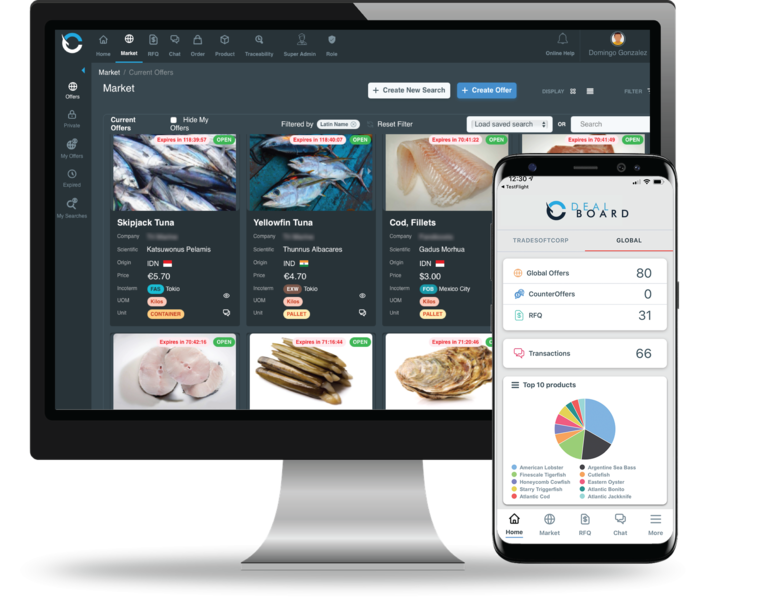Thursday, November 20, 2025
|
Thursday, March 9, 2023
Not all apps are created equal
 |
| Choose Wisely... |
“If I already know someone, why would I use a platform to communicate with them?”
We hear this from time to time – Dealboard members browsing
the thousands of metric tons available any given day on Dealboard, and finding
seafood offered by someone they know. Their temptation is to use their usual
ways of communicating with that party – email or WhatsApp.
Why not?
Here’s why not:
Email isn’t safe
Email is a great way to communicate, but it takes a lot of
work to make it really secure for sensitive communications such as negotiating
large transactions.
And, even with the best security measures in place, things
slip by – have you heard about this recent and high profile example of phishing
in the seafood industry? https://www.farodevigo.es/economia/2023/02/28/estafar-ceo-nueva-pescanova-anunciandole-83867748.html
The CEO in the article is clearly taking it in stride, and
even having a bit of a laugh about the situation. But this is only funny until
someone falls for it, and it’s only funny until it happens to you.
What sizable seafood company hasn't been spoofed in
the past year by an email communication that isn’t really coming from who it is
supposedly from? Things worse than this happen all the time.
Tightening your email security drives up your IT costs
significantly, and doesn’t mean something won’t happen to you. And if you fall
for it, the economic damage to your company could be irreparable.
WhatsApp isn’t much better
WhatsApp is great for instant communication, but you can
never be sure if the person you’re working with is still a representative of
the company you want to deal with.
People change jobs, and when they do they often take their
WhatsApp numbers with them. Suppose they move over to a competitor of yours…
are you really ready to share your prices, inventory and other key information
with your competition?
Then what?
Even if your email or WhatsApp conversations are not
compromised, and you successfully negotiate a transaction, what follows are a
lot of manual steps you need to do to communicate the deal terms to the rest of
your team to follow up with shipping and payment. That means you are re-typing
a lot of information rather than hunting your next deal, or you and your teams
are stuck chasing down misunderstandings with the other party.
What's needed is a safe room, a zone where seafood parties
can get their work done quickly, efficiently, and with reduced risk... so that
they can move on to the next deal and expand their business.
That's why not.
Wednesday, January 18, 2023
Evaluation Guide for Seafood e-Commerce Platforms
Seafood companies are prioritizing e-commerce platforms on
their agenda for 2023. It’s an idea whose time has finally come - with so many
changes taking place in availability, pricing, shipping and risk management,
seafood companies are recognizing the need for a bigger, more flexible network
of buyers and suppliers they trust, in order to grow their business in
challenging times.
But not all platforms are created equal. Here’s a guide for seafood companies ready to test the waters of e-commerce platforms this year. Make sure you ask and understand these 6 things to know the platform you select is right for you:
- Who’s
allowed into the club? Make sure it’s a trusted community you’re joining.
Does the platform let anyone in, or do they perform background checks
first? How strong are those background checks? Does the platform suspend
companies that violate the platform’s code of conduct?
- How real are the offers? How does the platform
ensure offers are real? One of the most frustrating parts of the online
experience is pursuing an offer only for it to vanish. Don’t become a
victim of companies who are more interested in fishing for your interest
than buying or supplying you actual fish.
- Who sees your offers and negotiations? The last thing you want
is for your competitors to see your prices, or for all your customers see
that you offered a better deal to your top 5 customers. Understand whether
anything you post in the platform is visible to non-members, and ask for a
demo to see for yourself how well you can control your own information
within the platform. Remember - negotiations and final terms of the deal
should never, ever, be visible to anyone but you and the buyer or supplier
you transacted with.
- Do you know who you’re trading with? Some platforms stand in
the middle of the transaction, so you don’t know who your buyer or
supplier is. Steer clear – you need to expand your network, not diminish
it.
- Can you try it for yourself before you commit? Does the vendor require
payment up front or do they let you see the value of their platform first?
Platforms are new, and all platforms don’t work for everyone. You can only
decide if it works for you by trying it out.
- What
is the vendor like to work with? E-commerce platforms offer great advantages. But you
need to be able to trust and rely on your vendor as much as you do your
buyers and suppliers. Do you have access to key staff or are you just a
number with no influence? Do they really listen and are they helpful?
Friday, September 23, 2022
Dealboard Returns to Conxemar
What a difference a year makes -- one year ago, Dealboard attended our first trade show, Conxemar, in Vigo, Spain.
What started as an exploratory information-gathering event turned into an overwhelming number of interested prospective customers, as the Dealboard value proposition of trust, security, efficiency, and a growing network resonated strongly with both seafood buyers and sellers.
We are returning to Conxemar again this year, October 4, 5 and 6, once again in Vigo. We hope to see you there!
This year, we look forward to seeing our current customers in person, in addition to welcoming more new members into the growing Dealboard trusted community which now includes buyers and sellers spanning 26 different countries.
Want to learn more? Send us a note at info@dealboard.biz or use this form, and we would be happy to set up a meeting at Conxemar!
Thursday, July 28, 2022
Will we see you in Singapore?
Will we see you in Singapore? Join the conversation at Seafood Expo Asia in September!
Registration link here (it's free) -- https://lnkd.in/djDMB3dX
Our own Steve Engdahl will be moderating a panel on innovation in seafood transactions in a session on Wednesday, September 14 at 11:15.
Contact us to schedule a meeting.
Thursday, July 21, 2022
How to give yourself the gift of time
“I don’t have time.”
How often do you seek someone’s attention only to hear that phrase? How often do you use that phrase with others?
In the seafood industry, where staff layers have been cut back and where margins are razor-thin, it’s customary to be extremely busy. Some may even feel a sense of importance because they don’t have room in their schedules.
But are you keeping busy with the right things?
Recall the Eisenhower Matrix, which organizes work based on urgency and importance:
|
|
Urgent |
Not Urgent |
|
Not Important |
Are you too busy here… |
|
|
Important |
|
…to have time for what’s
here? |
Wouldn’t it be nice to receive the gift of time? To free up
your schedule to focus on more important things, and things you don’t get
around to enough in your daily activities?
Negotiating seafood transactions is pretty important, and urgent, so this usually receives a lot of attention, rightly so.
But after the transaction is negotiated, what happens next? Hiding right behind the negotiation lies a host of necessary tasks which eat up valuable time. Think about all the different teams both inside and outside your company who need to be informed of the details of the transaction – logistics services, inspection services, operations, accounting, and more.
Dealboard believes you can gain back valuable time by rethinking how you connect the place where you negotiate transactions with the rest of your business. Any time you re-type something into another system or pick up the phone to recite information to someone else, you’re consuming your own time on tasks which, though urgent, aren’t the most important. To make matters worse, if you are anything less than absolutely perfect every time you do this, you might make a simple mistake and introduce an error which costs you and others even more valuable time to correct.
Give yourself and your team the gift of time by improving and automating your operations. Negotiate transactions using a platform which can automatically and flawlessly transmit the transaction details to the systems, departments and third parties who need to spring into action to fulfill it.
You deserve the gift of time.






